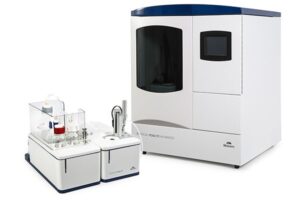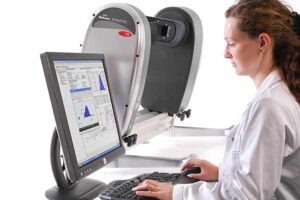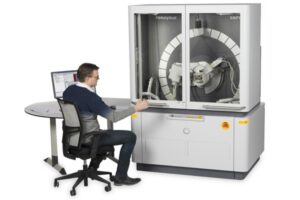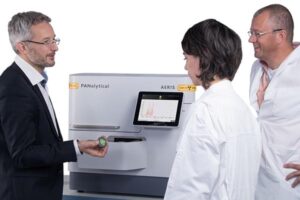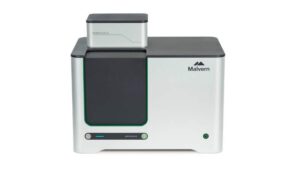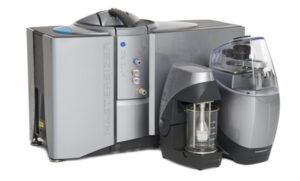Malvern to Host Two New Webinars in March
Malvern has announced two upcoming webinars this month: Differential scanning calorimetry (robust and powerful physical characterisation of therapeutic protein products) and Cement (composition, structure, and fineness – we are stronger together!).
First Webinar: Differential scanning calorimetry (robust and powerful physical characterization of therapeutic protein products)
Differential scanning calorimetry (DSC) is a robust and powerful physical method for characterising the thermal stability of proteins. During the life history of a commercial therapeutic protein product, DSC analysis is uniquely valuable from early discovery research to commercial product management.
Areas where DSC is used include comparing stability of potential drug candidates; conducting preformulation and formulation screening studies; biophysical characterisation of drug products for regulatory filings; comparability studies after a manufacturing change; and comparing a biosimilar to an innovator drug product.
DSC analysis of a protein can also provide insightful data in investigations of the roles of specific domains in the instability and aggregation of multi-domain proteins.
In this webinar, some examples of these applications will be described. In addition, results from studies on the effects of heating rate will presented, which demonstrate that faster heating results in both increased sample throughput and increased method sensitivity.
Finally, data will be presented from a recent biophysical comparison of antibody drug conjugates to the parent antibody. These results documented that important differences in thermal stability could readily be resolved and quantified with DSC, whereas during heating studies with various spectroscopic techniques no differences were discernible.
Taking place on 14 March at 10:30 til 11:30 Eastern US and Canada time (GMT-05:00), the webinar will feature speaker professor of pharmaceutical sciences and the Universirt of Colorado School of Pharmacy and co-founder and co-director of the University of Colorado’s Center for Phamaceutical Biotechnology John F Carpenter.
His research interests include mechanisms and analytical methods for protein degradation, as well as stabilisation in pharmaceutical formulations both during bioprocessing and in delivery systems.
Besides working for the University, John has worked for several years to define rational strategies for stabilising proteins and vaccines during freeze-drying and storage in the dried solid. He has published more than 230 peer-reviewed papers and is an inventor on 30 issued patents. In addition, he is editor for reviews and commentaries for the Journal of Pharmaceutical Sciences and he serves on the editorial advisory board for pharmaceutical research at the AAPS Journal, Journal of Pharmaceutical Sciences, Current Pharmaceutical Biotechnology, Molecular Pharmaceutics, and BioPharm International.
John has received several teaching awards and The Ebert Prize. He is a Fellow of the American Association for Advancement of Science and the American Association of Pharmaceutical Scientists (AAPS) and has received the AAPS Research Achievement Award in Biotechnology. He also is organiser of the Colorado Protein Stability Conference.
The audience will learn about the value that DSC and the assessment of thermal stability brings throughout the development of a biological drug product, whether an innovator molecule or a biosimilar. Real data will be shown from products currently in development.
This presentation will also explain the positioning of DSC among other similar and competitive types of analysis, providing information on the utilities of various technologies during development and manufacture. Further information will be provided on the real value provided by the latest DSC system on the market, the MicroCal PEAQ-DSC.
Anyone involved in biological drug or biosimilar development or manufacture, throughout the pipeline, who is interested in understanding the value of thermal stability assessment should attend. Also, those who would like to know about some of the practical advantages of the new MicroCal PEAQ-DSC systems will have an interest.
This presentation will follow development challenges throughout a biological drug product’s life cycle, from candidate selection, through early and late stage formulation development, through to assessing changes in manufacturing processes and biosimilarity. The audience will see real data from industrial biosimilarity assessments and understand the value of characterising their product’s thermal stability.
To register for the event, please click here.
Second Webinar: Cement (composition, structure, and fineness) – we are Stronger together!
Global demand for cement continues to increase and analysts project that the industry will maintain a healthy growth rate well into 2020. This positive outlook translates into mounting pressures on the manufacturers to increase throughput of new and existing plants, while striving to reduce the environmental impact of cement manufacture though process optimisation and use of clinker substitutes.
This presentation will review the importance of elemental and mineralogical analysis and the value of precise analytical data to plant operations. We will also discuss the importance of cement fineness and how precision and timeliness aspects of particle size analysis are related to production control and efforts to optimize grinding and reduce energy consumption.
Taking place on 22 March from 15:00-16:00 GMT, the webinar will feature speaker Harald van Weeren. Born in Hoorn in The Netherlands, he started his studies in Applied Physics at the University of Twente. In 2002, he finalised his studies with a Master’s Thesis on Nb3Sn superconductors. In that same year, Harald started his PhD research on MgB2 superconductors, where he focused on the material-science and the applicative aspects of this type of superconductor.
Just after finalising his PhD thesis in 2007, Harald worked as a postdoctoral research fellow on cryogenic micro-coolers for space applications at the University of Twente. In 2008, he joined PANalytical as product specialist non-ambient X-ray diffraction. Currently, he is product manager, focusing on X-ray diffraction for process control and market segment manager for the building materials industry.
Second speaker product development manager of process systems for Malvern Alon Vaisman is based at the company’s offices in Westborough, MA. He supports manufacturers in variety of industries world-wide in developing and improving their process operations through the use of in-process particle characterisation systems. Alon’s background is in mechanical engineering and he has more than 15 years of applications and support experience.
Plant managers, process engineers, laboratory managers, and quality assurance (QA) / quality control (QC) technicians should attend the webinar to learn to recognise the importance of implementing robust analytical methods for elemental, mineralogical, and fineness characterisation of cement and how the data can be used to improve and optimise various aspects of cement production.
Attendees can learn about the value and synergies between x-ray fluorescence (XRF), X-ray powder diffraction (XRD), and particle size distribution (PSD) analyses in cement manufacture and review the economic impact advanced analytical tools can have on plant performance.
Click here to register for the event.



